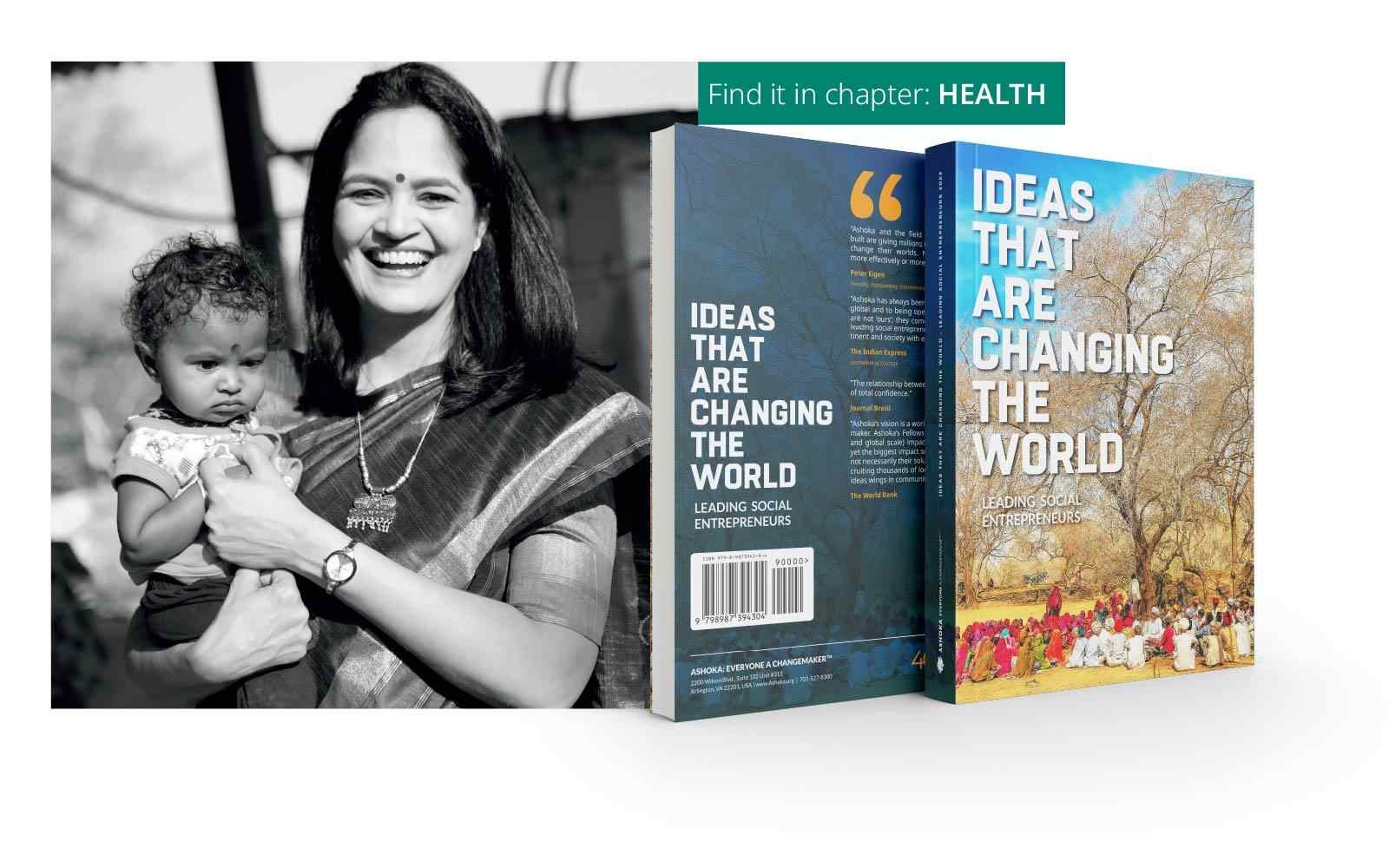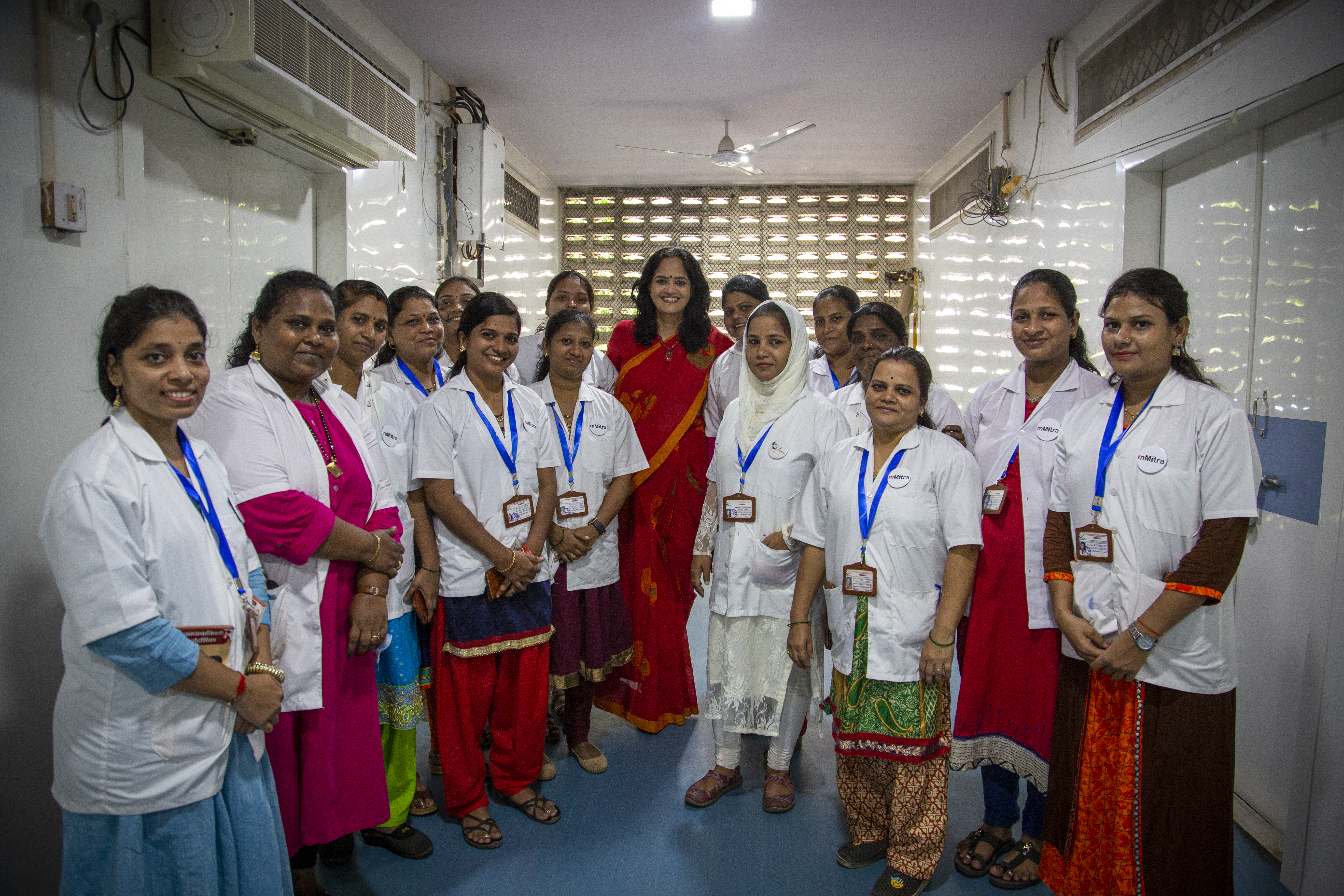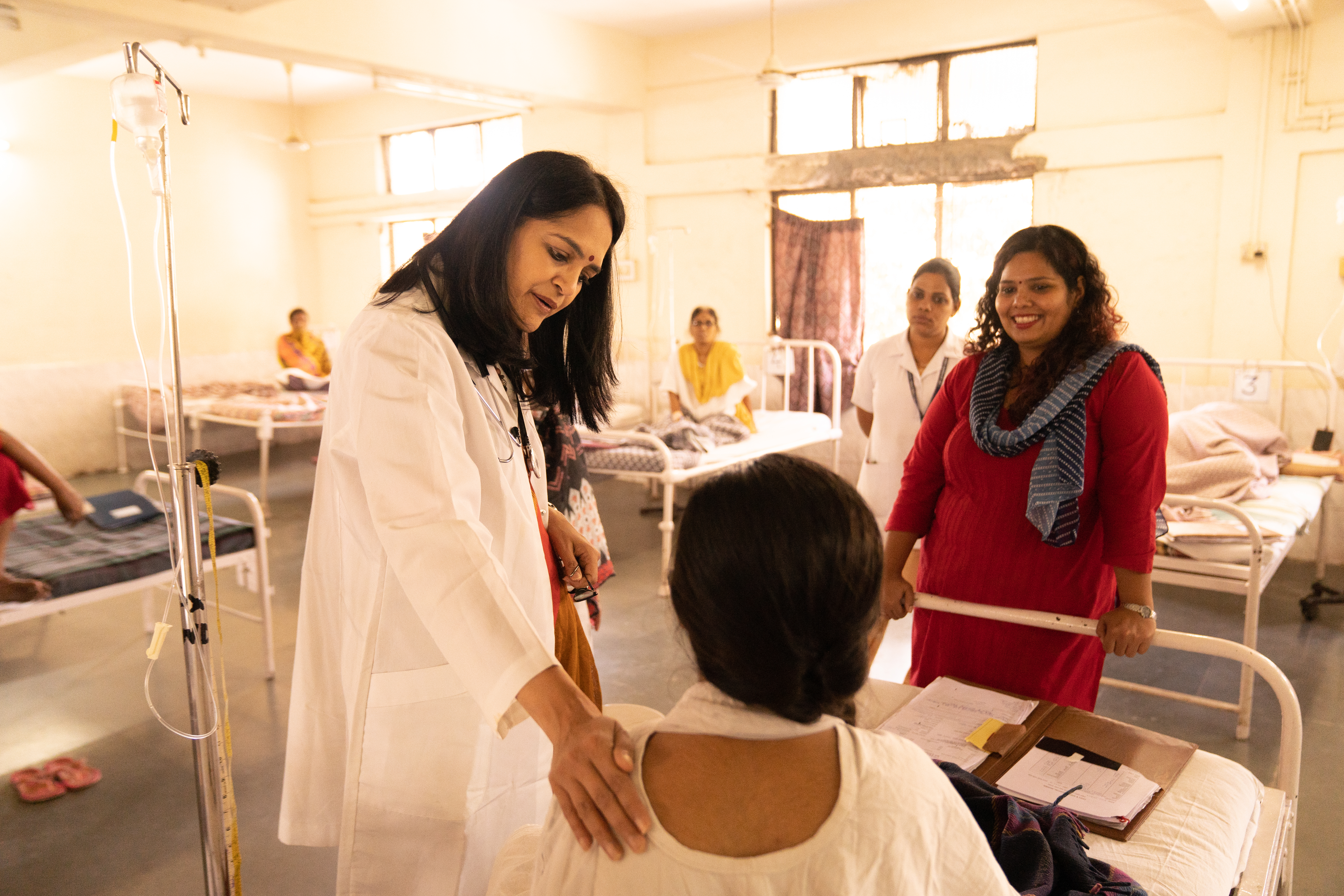Aparna Hegde
Founder, ARMMAN
Fellow project website: www.armman.org
Aparna Hegde conceived and scaled up the world’s largest system of mobile phone networks for maternal and neonatal medical information and healthcare training. The networks help tens of millions of women access timely, targeted information and care, thereby saving lives, improving maternal and child health, and changing the experience of pregnancy and childbirth from one of fear and trauma to one of hope and empowerment.

THE NEW IDEA
Maternal and infant mortality in India are frighteningly high, yet millions of mothers lack access to the necessary information and healthcare that could prevent it. To change that, Aparna and her organization built Kilkari, the largest maternal mobile voice messaging program in the world.
The service, which is free, delivers targeted, preventative care information to mothers in their vernacular language during pregnancy and early childhood, from the second trimester of pregnancy until the child is a year and a half, the period in which most deaths occur. Mobile phones are ubiquitous in India, and Kilkari effectively connects with some 25 million women and counting across the country, regardless of where they live or their literacy or educational attainment.
Aparna and her organization also created Mobile Academy, the world’s largest mobile-based training program for frontline health workers. It uses mobile phone networks to deliver refresher training and certification in maternal and child healthcare for government frontline healthcare workers, reaching over 235,000 workers in 16 Indian states and union territories.
These “tech plus touch” innovations are evidence-based, cost-effective, replicable, and growing on a national scale. They’re combining to close system-wide gaps in health service delivery in India and promote proactive health-seeking behavior among mothers, with dramatic improvements in outcomes. For example, one study of rural villages of Maharashtra state found that among the mothers who received preventative care information through mobile voice messaging and home-based consultation and referral services, the incidence of complications from pregnancy fell from 38% to 9%

THE PROBLEM
There are 30 million pregnancies a year in India, and one woman dies in childbirth every 15 minutes. For each of those deaths, 20 others suffer from lifelong disabilities from childbirth. Two Indian children under the age of five die each minute. HIV transmission from mother to baby contributes significantly to child mortality. Four out of ten Indian children’s growth is stunted by chronic malnutrition, which has lifelong consequences.
But it doesn’t have to be this way, and Aparna refused to accept it. “Pregnancy is not a disease,” she says. “Childhood is not an ailment. Dying due to a natural event is not acceptable.” 90% of these deaths and many of the other bad outcomes are preventable with the right interventions. Yet millions of Indian women can’t access them through normal healthcare delivery channels.
Aparna describes what she calls “the three delays” that can lead to lifelong disabilities and deaths from pregnancy complications. The first is the lack of access to necessary preventative care information. The second is the inability to physically get to a place to receive care. The third is a lack of trained staff, equipment, and supplies. Most deaths and disabilities could be prevented if it weren’t for these chronic problems.
46% of maternal deaths and 40% of neonatal deaths happen during labor or within the first 24 hours of birth, most often from such causes as birth asphyxia, infections, or prematurity. The mortality risk correlates to some degree with the mother’s income, level of education, and the rural-urban divide. But the larger factor determining survival and health outcomes is the ability or inability to access prenatal and postpartum information and care, proper nutrition, sanitation, and hygiene. For example, there are interventions that can prevent HIV transmission from mother to baby, but if mothers can’t access them, the risk is as high as 45%.
The Indian government offers free monthly healthcare visits during pregnancy, but most women can’t take advantage of them, especially in rural areas, because they can’t give up a day’s earnings to travel to a distant healthcare facility. In Bihar, for example, just 3.3% of pregnant women reported fully accessing government prenatal care, despite it being free. Instead, mothers often rely on informal care from people who aren’t medically trained.
India’s government and civil society organizations have been working to address these systemic design and resource issues, but problems persist. Historically their programs often relied on expensive pilots and/or access to hospitals and professionals, which made them difficult to scale. Most were narrowly focused on childbirth, but, as Aparna understood, protecting mothers and children re- quires a more holistic approach including antenatal care during pregnancy, specialized care during childbirth, and ongoing support in the weeks and months after birth.
THE STRATEGY
Through her incisive understanding of service gaps, and her remarkable ability to leverage partnerships to fill them in innovative, large-scale ways, Aparna has succeeded where government and CSO programs often failed, supplying the basic care and information that long eluded many millions of Indian women, cutting across regional and societal divides, preventing maternal and child deaths and disability on a continental scale.
Aparna started by creating an online platform for real-time data on the availability of ICU beds and blood types at hospitals across India. But she soon had the fundamental insight that reaching more women required shifting from hospital-based care to preventive care. Working with healthcare facilities, technology companies, CSOs, the Indian government, and local communities, she focused attention on early identification, referral, and treatment of risk factors in pregnant women and children which could keep them out of the hospital. That was a structural shift that ended up bridging service gaps and improving many elements of India’s primary health care and referral systems.
Hegde met plenty of skeptics—it took five years to get external funding—but today, her nonprofit, which partners with the Indian government and dozens of NGOs in 17 states across the country, represents one of the largest mobile health programs in the world and a lifeline for women in India. - FORBES
Working with partners, Aparna conducts “community needs assessment” research to inform her organization’s program designs, and uses the high penetration of mobile phones across India to scale those programs up cost-effectively without loss of impact.
One of Aparna’s early successes was her mMitra program, which uses mobile voice messaging to deliver free preventive healthcare information to mothers during pregnancy and infancy. The program cost less than five dollars per recipient to run and reached women in rural as well as urban areas. After a few years of operation, by 2016 the program had enrolled a million women in 15 states. Compared to the general population, enrolled women had 25% higher rates of adequate iron and folic acid supplementation, and 17% more of their babies tri-pled their birth weight at the end of their first year.
Building on the achievements of mMitra, Aparna partnered with India’s Ministry of Health and Family Welfare to create Kilkari, the world’s largest mobile messaging network for maternal and neonatal care information, available in five languages. It reaches some 25 million women and counting with life-changing and life-saving health information.
In rural and tribal areas that lack cell service or have low mobile phone penetration, the information is recorded on mobile devices, and female health workers trained by Aparna’s organization play it for mothers during home visits.
Aparna also built Mobile Academy, the world’s largest mobile-based training program for frontline government healthcare workers, created in partnership with the Ministry of Health and Family Welfare. Mobile Academy reaches over 235,000 workers and counting in 16 Indian states and union territories. The training refreshes workers' knowledge of life-saving preventative care measures and effective ways of connecting with mothers and families. The training is available in four languages and is expanding India’s capacity to manage pregnancies ranging from routine to high-risk.
One of the keys to the scale and impact of Aparna’s programs is that they don’t just disseminate expert information or provide continuing education for healthcare professionals; they also empower women in the community to take an active role in improving maternal and neonatal health.
For example, Arpana designed a program that trains local women to provide basic home-based antenatal and infancy care, for which they get paid a small fee. A mobile tablet application helps these local women identify high-risk signs and symptoms, alerts them when referrals for treatment are needed, and provides resources for counseling. These women help expand healthcare delivery to hard-to-reach areas.
Working to connect with women in need wherever they are, Aparna’s organization enrolls women in its programs through what Aparna calls “two verticals” – – a hospital vertical where healthcare workers register women during their first check-up visit, and a community vertical where partner CSOs on the ground register women in poor communities. Community health workers also enroll women in the early stages of pregnancy and get a small incentive for signing those women up.
These strategies are creating a new class of health entrepreneurs, empowering women in the community to improve health outcomes and get paid for it, and extending the reach of Aparna’s programs far beyond the former limitations of the healthcare system. As of 2020, the various programs from Aparna and her organization benefitted some 20 million pregnant women, mothers, and children, and 1.7 million healthcare workers across India.
As the reach of Aparna’s programs has grown, she has continually demonstrated her ability to adapt to changing healthcare needs. For example, when the pandemic hit, India’s hospitals converted to COVID centers, so Aparna launched a virtual clinic to fill the resulting gap in antenatal and pediatric care. Its mobile network and virtual training platform were also impactful tools for educating women and health workers about COVID-19 and vaccination.
THE PERSON
Aparna was born into a lower-middle-class family in Mumbai, India. Her family had to work hard to make ends meet, but Aparna understood that she was lucky, since growing up in Mumbai afforded her opportunities for education and pursuing her dream of becoming a doctor.
Mindful of her privilege, as a young person she empathized with those who weren’t so lucky and was attracted to causes on their behalf. Aparna worked with the Akanksha Foundation, helping develop small clusters of model schools that were designed to be replicated across the education system. She also felt strongly about animal safety and rights and worked for the welfare of stray dogs in Mumbai.
After medical school, Aparna did her residency near the Nallasopara slums of Mumbai. One day, while working in the clinic, a woman from one of the slums arrived in labor, convulsed with hypertension, and died from the condition. When Aparna opened her records, she was stunned to recognize her own handwriting. Aparna had seen the woman before, during the third month of her pregnancy, but she hadn’t come back to the clinic after that. Aparna was stricken with guilt. She wondered, “Had the overcrowding in the clinic meant that I had not counseled her enough to watch for signs of trouble or to seek regular care?” Aparna saw cases like this every day: preventable deaths of women and children that could have been averted by a little information or some routine care at the right time, if only health workers were trained to provide it, and if only the women could access it before it was too late. The preventable death of her one-time patient galvanized Aparna, and set her on the path to becoming the highly impactful social entrepreneur she is today. “It instilled the spark in me, that now we try to instill in the millions of women and children we serve,” she said.

From the beginning of her career Aparna was committed to using her specialized knowledge and skills (she holds three medical degrees, a master’s degree in biological sciences from Stanford University and an International Fellowship in Urogynecology and Pelvic Reconstruction Surgery) to benefit people who lack access to specialist care, especially women and children from lower socio-economic backgrounds. For example, Aparna worked closely with Ashoka Fellow Armida Fernandez as Armida was launching her first venture to deliver quality maternal and neonatal health care to low-income families. That experience helped Aparna recognize the potential of technology to transcend the limits of the existing healthcare systems to deliver the care and information that mothers and infants need.
Today, through her firsthand insights into service gaps in India’s healthcare system, her serial innovations to fill them, and her talent for building strategic partnerships to extend their reach, Aparna is fundamentally changing how and by whom healthcare is delivered, empowering more women to deliver it as well as receive it. As a result, Aparna is saving and improving millions of lives.